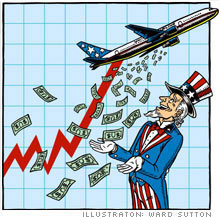The airline bailout bountyGovernment bailouts are costly for taxpayers, but equity provisions can help offset the loss. Fortune's Jon Birger reports.(Fortune Magazine) -- Four major airline bankruptcies and thousands of layoffs later, 2001's $15 billion airline-bailout bill hardly looks like taxpayer money brilliantly spent. However, with airline stocks on the rise, a little-noticed provision tucked into the final bill is helping the feds recoup some of those funds in the form of capital gains. The agreement was authored by then-Senators Jon Corzine (D-New Jersey) and Peter Fitzgerald (R-Illinois), two lawmakers with financial backgrounds - Corzine as CEO of Goldman Sachs and Fitzgerald as general counsel of a bank his family owned.  The bailout bill authorized $5 billion in direct grants and up to $10 billion in loan guarantees for airlines. But the stipulation inserted by the Senators authorized the Treasury Department's Air Transportation Stabilization Board to negotiate equity warrants - options to buy airline stock at below-market prices - from any airline getting guarantees. (ATSB executive director Mark Dayton notes that to avoid conflicts of interest, the government-owned shares were pegged as nonvoting.) Six years later the Corzine-Fitzgerald amendment has netted $119 million for the Treasury in the form of profits from shares of Frontier (Charts) and America West. Add in the current value of ATSB's unsold World Airways (Charts) warrants, and the tally grows to $130 million. (And no, the Treasury Department doesn't have to pay capital gains tax on the profits.) The most lucrative deal was a $429 million guaranteed loan to America West. Not only was it repaid in full, but America West also issued the ATSB a warrant to purchase 18.8 million shares, which represented a third of the company's common stock, and allowed the ATSB to buy it at $3 a share. By the time the ATSB cashed out, the stock was up to $9. (America West merged with US Airways in 2005.) The overall success of the Corzine-Fitzgerald amendment raises a question: Why don't federal and state governments demand equity in exchange for aid to the private sector more often? For instance, if the National Institutes of Heath gives a $21 million grant for HIV research to a biotech startup, as it recently did to Argos Therapeutics of North Carolina, shouldn't taxpayers be entitled to a small stake in the company - especially if that research winds up creating a windfall for Argos's venture capital investors? The 1979 Chrysler bailout included this type of equity kicker - one that eventually netted more than $300 million for the Treasury - but otherwise such provisions have been rare. According to Fitzgerald, who left the Senate in 2005, the reason equity kickers aren't more common is simple: Corporate lobbyists just won't let it happen. He says the only reason his and Corzine's provision passed was that the airlines broke ranks. Bigger players that opted not to take loans didn't want smaller rivals gaining a government-funded edge without a penalty. "The airlines that intended to apply for the loan guarantees fought our amendment, but we prevailed because the airline industry as a whole was divided on the issue," says Fitzgerald. Happily for taxpayers, the airline biz is a model of dysfunction. |
Sponsors
|
